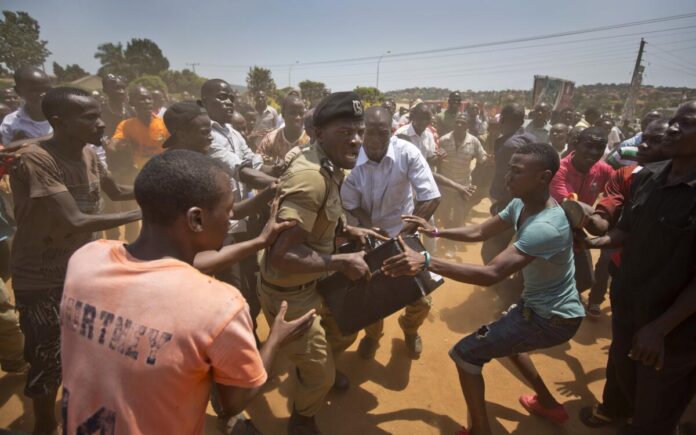
Last month, in compliance with Article 61 (1)(e) of the Constitution of the Republic of Uganda, and Section 20 of the Electoral Commission Act (Cap 176), the Electoral Commission commenced a General Update of the National Voters’ Register, in preparation for the 2025-2026 General Elections.
As the electoral road map commences, stakes are very high amongst various political parties, actors and the general population about the ability of the Electoral Commission to organize and manage a peaceful, and free and fair election. There is a serious concern about the probability of having a non-violent election cycle. Is it the end or the beginning of the end to electoral violence in Uganda?
Because no election is perfect, each election carries with it the potential of a heightened conflict, which in many situations can degenerate into violence, with direct effects on national stability, democracy, human rights or development. There is a recent example of the November 2020 arrest of the NUP presidential candidate Bobi Wine while campaigning in Luka district of Eastern Uganda prior to the general elections which led to an outbreak of riots and protests in Kampala and suburbs which resulted in destruction, chaos and deaths. This was so massive and the country was on the verge of a civil war. Could this happen again in 2026?
In countries with a history of electoral violence, Uganda inclusive, young people are often involved as perpetrators or victims of the violence. That is because they are often used as foot soldiers by politicians and armed groups that want to disrupt polling. This is so because the youth are vulnerable for political exploitation as the case is in Malawi after contested polls last year.
In two separate videos recorded on 07/01/2025 and 13/01/2025 on a TikTok account ‘Sanya wa Bobi’, Sanya asserts that the Electoral Commission Chairperson Simon Byabakama will never declare Bobi Wine the NUP hopeful presidential candidate as president and urges Ugandan to rise up and declare Kyagulanyi as president in 2026. He adds that ‘..….it is the right time for you Kyagulanyi to go to America and request for guns so that we can use the guns when we are still youths to overthrow the regime, but don’t think that the election will declare you as president…….If it requires burning the city, okay lets set it ablaze so that they arrest us all and we see…………….’’ Is there a possibility of success for any of Sanya’s post-election violence calls?
Tensions may also arise in the run-up to the election process as some candidates are mobilizing along extremist lines to win support. A good example is the alliance of the criminal gang led by Alien Skin with Mathias Mpuuga, a hopeful presidential candidate in the 2026 election. The gang leader was heard during the New Year’s Enkuuka festival threatening more violence during the general 2026 elections. Also, cases of arrests and ‘un-necessary’ interferences and disruptions by security agencies may also lead to discontent by candidates or electorates.
It should be noted that during election events, violence may also become evident in the days before or during voting as the drama of the contest unfolds. After the voting, there is also a continuing potential for post-election violence especially when allegations of electoral fraud and corruption emerge, or when those dissatisfied with the outcomes of elections take to the streets like in Malawi or in grave instances, the battle field to challenge the election for example the Military Coup against Omar Bongo dynasty in Gabon was a result of election dispute.
Election process management and administration has a strong bearing on electoral violence. An election considered to be free, fair and transparent will less likely result in electoral violence than that where allegations of mismanagement or deliberate cheating are prevalent. This was evident especially during the 2020 sham NRM party primaries where even violence broke out in some constituencies. Did the NRM party learn any lessons from the sham 2020 general primaries? Is there any possibility of the same chaos in the other political parties?
There were also cases of delays in ballots and polling materials to polling stations in cities and urban centers like Kampala and Wakiso, and also military involvement in the electoral processes all of which are potential violence threats in the force coming general election
State actors majorly the Electoral Commission and the Uganda Police (excluding the army) hold the key to peaceful elections through their central responsibility in maintaining security and election management. When acting appropriately, across the election cycle, security forces and election administrators will effectively manage the incentive structure of potential perpetrators, and overcome those challenges that frequently give rise to election violence.
Adequate domestic consideration of election security and the quality of the electoral process will also boost the likely effectiveness of grassroots or international prevention.
Elections do not cause violence, instead the root causes of conflict are often found in deep-rooted socio-political or economic issues in dispute. Elections that give a voice to the people are in essence a critical means of social conflict management through peaceful deliberations and decision making processes in which winners carry out promised policy initiatives and programs and losers are given the opportunity to serve as a loyal opposition, and to try again in future competitions. Is it the end or the beginning of the end to electoral violence in Uganda?
Richard Byamukama is a lawyer and also a Security Studies Expert














